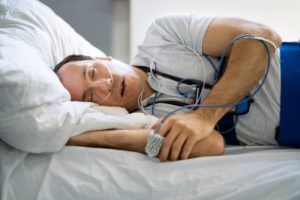Have you been struggling to feel well-rested lately? Do you frequently snore? Do you often wake up with a headache or sore throat? If so, it is possible that you have obstructive sleep apnea (OSA). Before you can receive treatment, you need to be officially diagnosed.
Some patients must go to a laboratory to undergo a sophisticated sleep test. Others, though, are candidates for a more convenient option — at-home sleep apnea testing. How does an at-home test work, and what can you expect throughout the process? This blog post explains what you should know.
What Is an At-Home Sleep Apnea Test?
If your doctor suspects that you have OSA, they may let you borrow some monitoring equipment that you will be expected to wear when you go to sleep. The equipment may measure things like:
- Your respiratory activity
- Heart rate and blood oxygen levels
- Nocturnal movements
- Sleep position
- Snoring events
After you return the monitoring equipment and an expert reviews your test results, you might be diagnosed with sleep apnea. If the results are inconclusive, you may need to undergo an in-lab sleep test or other diagnostic procedures.
What to Expect with an At-Home Sleep Apnea Test
Sleep apnea test kits should not be complicated to use. You may need to put a sensor around your chest and attach a small oximeter to one of your fingers. If you have trouble figuring out how to use the equipment, call the office that provided it.
Once everything is set up, you should try to sleep as normal. Usually, one night of monitoring is enough to provide accurate results. After you return the testing equipment, it should not be long before you can review the results with your doctor and start talking about OSA treatment options.
Tips for a Successful Testing Experience
Here are a few tips to make sure that your results are as accurate as possible:
- Do not nap during the day.
- Do not drink alcohol or caffeine too close to bedtime.
- Do not eat a heavy meal right before bed.
- Do not use a sedative to help you fall asleep.
- Try to avoid the use of medications that cause drowsiness.
- Carefully follow any other instructions provided by your medical team.
At-home sleep testing is a simple and accurate process that could get you on the road to better health! Why not ask your doctor if you are a candidate for it?
Meet the Practice
At the Go to Sleep Center for CPAP Alternatives, our Scottsdale team wants to help members of our community find freedom from OSA via comfortable, effective oral appliance therapy. If you have been diagnosed with sleep apnea, or you suspect you have it, we would be happy to guide you on your next steps. Contact our office at 623-254-7433.

